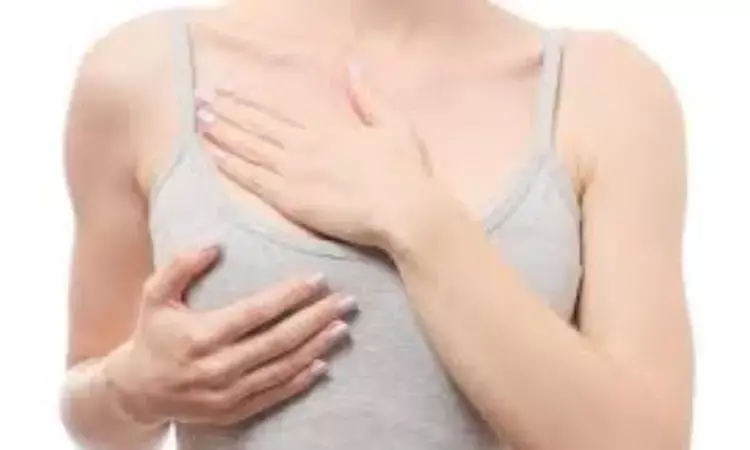- Home
- Medical news & Guidelines
- Anesthesiology
- Cardiology and CTVS
- Critical Care
- Dentistry
- Dermatology
- Diabetes and Endocrinology
- ENT
- Gastroenterology
- Medicine
- Nephrology
- Neurology
- Obstretics-Gynaecology
- Oncology
- Ophthalmology
- Orthopaedics
- Pediatrics-Neonatology
- Psychiatry
- Pulmonology
- Radiology
- Surgery
- Urology
- Laboratory Medicine
- Diet
- Nursing
- Paramedical
- Physiotherapy
- Health news
- Fact Check
- Bone Health Fact Check
- Brain Health Fact Check
- Cancer Related Fact Check
- Child Care Fact Check
- Dental and oral health fact check
- Diabetes and metabolic health fact check
- Diet and Nutrition Fact Check
- Eye and ENT Care Fact Check
- Fitness fact check
- Gut health fact check
- Heart health fact check
- Kidney health fact check
- Medical education fact check
- Men's health fact check
- Respiratory fact check
- Skin and hair care fact check
- Vaccine and Immunization fact check
- Women's health fact check
- AYUSH
- State News
- Andaman and Nicobar Islands
- Andhra Pradesh
- Arunachal Pradesh
- Assam
- Bihar
- Chandigarh
- Chattisgarh
- Dadra and Nagar Haveli
- Daman and Diu
- Delhi
- Goa
- Gujarat
- Haryana
- Himachal Pradesh
- Jammu & Kashmir
- Jharkhand
- Karnataka
- Kerala
- Ladakh
- Lakshadweep
- Madhya Pradesh
- Maharashtra
- Manipur
- Meghalaya
- Mizoram
- Nagaland
- Odisha
- Puducherry
- Punjab
- Rajasthan
- Sikkim
- Tamil Nadu
- Telangana
- Tripura
- Uttar Pradesh
- Uttrakhand
- West Bengal
- Medical Education
- Industry
Norepinephrine has positive effect on hemorrhage, pain, and hospitalization in MAMIR for Benign Breast Nodules: Study

A recent study published in the journal BMC Surgery found that norepinephrine has protective effects on intraoperative hemorrhage and postoperative pain and also helps to reduce hospitalization in individuals undergoing resection of benign breast nodules.
Breast tumors are common among women and range from benign to malignant. Benign tumors are non-invasive but affect function and aesthetics, needing surgical removal. Mammotome-assisted minimally invasive resection (MAMIR) is increasingly used for managing benign nodules of the breast. However, the procedure involves many technicalities and is challenging. Previous research has shown that norepinephrine may improve the surgical effect and reduce intraoperative hemorrhage and pain caused by surgery. Hence, Chinese researchers conducted a study to assess the efficacy of norepinephrine application in MAMIR concerning intraoperative hemorrhage, postoperative pain, and postoperative hospitalization.
This retrospective cohort study included 306 patients with breast nodules admitted at the Xishan People’s Hospital of Wuxi City between June 2021 and July 2023. Patient’s data, including age, comorbidities like hypertension and diabetes, and characteristics of the breast nodule (number, unilateral or bilateral nature, inner quadrant volume, and total volume), were carefully recorded. Operation time, intraoperative hemorrhage, postoperative hospitalization, and Visual analog scale (VAS) score, including postoperative 6-hour pain score, were also documented. Patients were categorized into non-NPP (norepinephrine) and NPP groups based on the application of norepinephrine. Univariate and multivariate analyses were performed to estimate the odds ratio (OR) and the 95% confidence intervals (CIs) for outcomes.
Findings:
- A total of 155 individuals who accepted MAMIR were included in the study.
- Intraoperative bleeding, postoperative pain, and the duration of hospitalization were less in the NPP group (p < 0.05).
- According to the Univariable analysis, norepinephrine usage reduced intraoperative hemorrhage during the surgery, alleviated postoperative pain, and shortened hospital stay.
- Multivariate analysis revealed that norepinephrine usage was an independent factor during MAMIR as it was associated with reduced intraoperative hemorrhage and postoperative pain after adjusting for other factors.
Thus, the study concluded that adding norepinephrine to assist local infiltration during preoperative local anesthesia improved the operational details. It resulted in reduced intraoperative hemorrhage, postoperative pain, and postoperative hospitalization. The researchers added that the addition of norepinephrine was safe, effective, and an independent positive predictive factor for reducing pain and hemorrhage in MAMI for benign breast nodule surgery.
Further reading: Sun, Y., Xu, Z., Hu, J. et al. The efficacy of norepinephrine application in Mammotome-assisted minimally invasive resection for benign breast neoplasm: A retrospective study. BMC Surg 24, 393 (2024). Doi: https://doi.org/10.1186/s12893-024-02701-y
BDS, MDS
Dr.Niharika Harsha B (BDS,MDS) completed her BDS from Govt Dental College, Hyderabad and MDS from Dr.NTR University of health sciences(Now Kaloji Rao University). She has 4 years of private dental practice and worked for 2 years as Consultant Oral Radiologist at a Dental Imaging Centre in Hyderabad. She worked as Research Assistant and scientific writer in the development of Oral Anti cancer screening device with her seniors. She has a deep intriguing wish in writing highly engaging, captivating and informative medical content for a wider audience. She can be contacted at editorial@medicaldialogues.in.
Dr Kamal Kant Kohli-MBBS, DTCD- a chest specialist with more than 30 years of practice and a flair for writing clinical articles, Dr Kamal Kant Kohli joined Medical Dialogues as a Chief Editor of Medical News. Besides writing articles, as an editor, he proofreads and verifies all the medical content published on Medical Dialogues including those coming from journals, studies,medical conferences,guidelines etc. Email: drkohli@medicaldialogues.in. Contact no. 011-43720751




